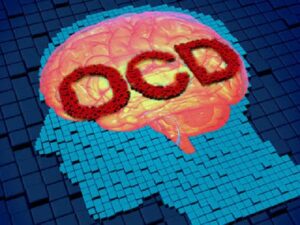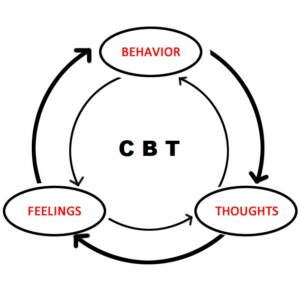Obsessive-Compulsive Disorder (OCD) and Tics are two of the most common anxiety disorders. While many people living with OCD and Tics can lead perfectly normal lives, some cases require medical treatment. The good news is that there are a variety of treatments for these conditions. From medication to cognitive-behavioral therapy, this article will explore the different types of treatments available for individuals living with OCD and Tics. We will discuss the pros and cons of each option and aim to provide you with an overview of what treatment might look like for various individuals.
Contents
What is OCD?

Obsessive-compulsive disorder (OCD) is an anxiety disorder in which people have unwanted and repeated thoughts, feelings, images, or sensations (obsessions) and engage in behaviors or mental acts in response to these obsessions ( compulsions).
People with OCD may be troubled by obsessions, such as a fear of germs or of being dirtied by a contaminating substance. Or they may be obsessed with orderliness, and feel compelled to arrange their possessions just so. Sometimes people with OCD have both types of obsessions.
Compulsions are the second part of OCD. They’re the activities people with OCD perform to try to relieve their anxiety. For example, someone who is afraid of germs might wash his or her hands over and over again. Or someone who feels compelled to keep things tidy might spend hours straightening up. compulsions can also take the form of avoiding certain situations that trigger anxiety.
Although most people with OCD recognize that their obsessions and compulsions are excessive and unreasonable, they feel powerless to overcome them. As a result, OCD can interfere with work, school, and personal relationships.
What are TICs?
TICS are sudden, repetitive, involuntary movements or vocalizations. They are common in childhood and can persist into adulthood. Tics can be mild, like blinking or twitching, or more severe, like grunting or cursing. People with tics often have more than one type of tic. Tics are not always consistent; they may come and go, and their intensity may vary.
Tics are classified as either motor or vocal. Motor tics involve movement of the face, head, arms, or legs. Vocal tics involve sounds made by the mouth, such as grunting, coughing, or throat-clearing.
Most people with tics do not need treatment. However, if tics are severe enough to interfere with daily life or cause distress, there are several treatment options available.
Types of Treatment for OCD and TICS
There are many types of treatment for OCD and TICS, and the best type of treatment depends on the individual. Some common types of treatment include:
Cognitive Behavioral Therapy (CBT)

One of the most common forms of treatment for OCD and TICS is cognitive behavioral therapy (CBT). CBT helps individuals identify negative thought patterns and teaches them strategies to manage and modify their thoughts. It can help individuals learn how to replace obsessive or compulsive behaviors with healthier coping strategies.
Exposure and Response Prevention Therapy
Exposure and response prevention therapy (ERP) is another type of treatment often used to treat OCD and tics. ERP involves gradually exposing the individual to their feared situations and objects while teaching them how to resist the urge to perform compulsions or rituals. This type of therapy helps individuals build up a tolerance for anxiety-provoking situations, which can help reduce symptoms of OCD and tics over time.
Medications
In some cases, medication may be used in combination with other treatments for OCD and tics. Common medications used include antidepressants, antipsychotics, mood stabilizers, beta-blockers, clonidine, guanfacine, benzodiazepines, or other drugs specifically designed to treat OCD or tic disorders. Medications should always be taken as prescribed by a doctor or psychiatrist.
Biofeedback Training
Biofeedback training is another form of treatment that can be used to help manage OCD and tics. This type of therapy teaches individuals how to monitor and control their body’s responses to anxiety-provoking situations. By learning relaxation techniques, individuals can better manage their symptoms.
No matter which type of treatment is chosen, it is important to seek professional help to receive the best possible care. A combination of treatments can often produce the most positive results.
Alternative Therapies

In addition to these more traditional treatments, several alternative therapies may help manage OCD and tics. These include acupuncture, massage therapy, yoga, mindfulness, and hypnosis. However, these alternative therapies should be used in conjunction with other more evidence-based treatments. These alternative therapies can help reduce stress and anxiety, which can in turn help reduce symptoms of OCD and tics.
Pros and Cons of Each Treatment Type
There are many different types of treatments for OCD and TICs, and each has its pros and cons. Some common treatments include medication, cognitive behavioral therapy, exposure, and response prevention, and habit reversal training.
- Some of the benefits of medication include the ease of taking a pill and the fact that it can be quickly started. The downside is that there may be side effects and they may not work as well for everyone.
- The benefits of cognitive behavioral therapy (CBT) include learning how to identify and change patterns of thought and behavior that lead to OCD and TICs. The downside is that it can be time-consuming and expensive, and the results may not be immediate.
- Exposure and response prevention therapy helps people with OCD confront their fears without engaging in their compulsive behaviors. It is usually effective but can be difficult for some people because it requires facing anxiety-provoking situations.
- Finally, habit reversal training helps people with tics by teaching them different strategies for managing their responses. This type of therapy is generally successful but does require time and effort from the person with TICs to practice the skills learned in therapy.
How to Choose the Right Treatment for You?

With so many options available, it can be hard to decide which one is best for you. Here are some tips to help you choose the right treatment for you:
1. Determine Your Goals: Before you start exploring different treatments, it’s important to have a clear idea of what your goals are and what type of outcome you hope to achieve. This will help guide your decision-making process and ensure that the treatment you choose is effective for your particular situation.
2. Research Different Options: Once you have a better understanding of what kind of results you’re looking for, start researching different types of treatments and decide which one might be the most beneficial for you. Look at both traditional and alternative methods and consider factors like cost, effectiveness, side effects, etc.
3. Talk To A Professional: Speak with a medical professional or therapist who has experience in the field to get their opinion on the best type of treatment for your particular needs. They will be able to provide personalized advice based on their expertise and knowledge of various treatments available today.
4. Consider Your Lifestyle: Think about how certain treatments might fit into your daily routine and lifestyle habits. For example, if you’re already pressed for time, a treatment that requires frequent visits or daily activities might not be the best option.
5. Listen To Your Gut: At the end of the day, you’re the one who knows what feels right for you. Trust your gut and choose a type of treatment that you feel comfortable with.
Choosing the right treatment can be overwhelming but taking some time to research and talk to professionals can help make the process easier and ensure that you find a solution that works for you.
Conclusion
OCD and TICS can hurt your life, but there are various treatment options available that can help you manage the symptoms. Depending on your specific needs, lifestyle, and preferences, you may find one or more of these treatments to be effective in helping you cope with OCD and tics. If you feel overwhelmed by the choices or uncertain about which type of treatment would work best for you, talking to a healthcare professional is recommended so they can guide you toward making an informed decision.
For more information and guidance, please contact OCDMantra. OCD is a mental health disorder characterized by obsessions and compulsions. If you have any queries regarding OCD treatment, ERP therapy experienced therapists at OCDMantra can help: Book a trial OD therapy session.


